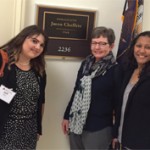Over the past several years, the ACR has collectively ramped up its advocacy efforts. Under the leadership of the Government Affairs Committee and with the combined advocacy efforts of many ACR/ARHP members and their patients, we made considerable progress advancing priority issues in 2015.
With the ongoing effort of ACR members and patients, we can continue to advance legislation that supports rheumatology in both chambers and have it signed into law. It takes emails, in-district visits and phone calls, and most importantly, it takes dedicated grassroots advocates who are willing to go the extra mile to push their elected officials.
Get Your Patients Involved
It’s crucial to remember that all legislators—on the federal, state and local levels—are politicians whose continued success depends on their ability to satisfy voting constituents. Re-election, recognition and status are powerful motivators. Effective grassroots advocacy can wield as much influence over these outcomes as the biggest corporation or trade association.
The patient voice is necessary to shed some light on public health issues and increase national awareness. Patients are constituents, too, and have personal stories that illustrate the issues faced every day by the rheumatology community. Their perspectives often include firsthand experiences with the challenges of accessing rheumatologic care or treatments, and can highlight the need for more research funding to keep care breakthroughs advancing.
How Patients Can Be Involved in the ACR’s Advocacy Efforts
- Encourage patients to apply to and attend the ACR’s annual Advocates for Arthritis conference in Washington, D.C. Advocates for Arthritis engages ACR/ARHP members and patient advocates in political advocacy and increases awareness of rheumatology issues on Capitol Hill. Participants meet with members of Congress and their staff to discuss current legislative issues that affect the rheumatology community. This event is an opportunity for members and patients to establish valuable relationships with both legislators and their staff.
- Encourage patients to contact Congress by visiting the ACR’s Simple Tasks Legislative Action Center. Elected officials rely on constituent input to be effective legislators and ongoing communication is the only way they know how their constituents feel about particular issues. Encourage your patients to call, write or meet with their members of Congress to educate them about the diseases and conditions affecting the patients’ quality of life. Patients can visit the Legislative Action Center to find contact information for members of Congress.
- Encourage patients to share their story through the ACR’s Simple Tasks campaign. If you have a patient with a great testimonial of how access to services or treatment has dramatically affected their life, encourage them to contact [email protected] to share their story.
Getting involved in advocacy is a great way to influence the legislative process. Without the patient voice, delivering meaningful results would be difficult—if not impossible. Remind your patients that their voices are needed and their actions will make a difference to rheumatology.
Kelly Weselman, MD, is chair of the ACR Committee on Communications and Marketing.


